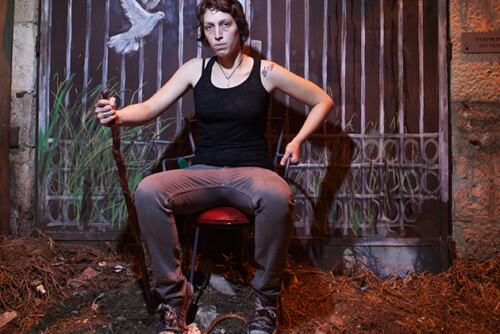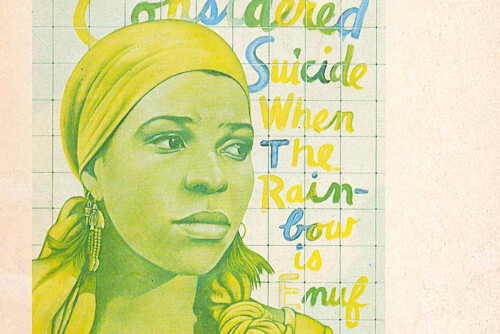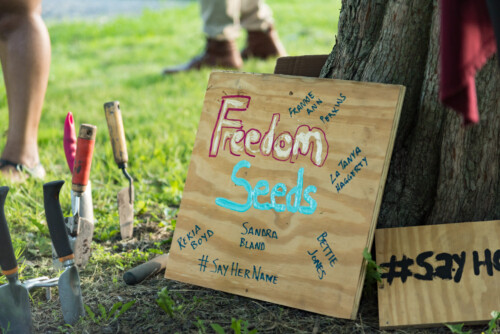The ecstatic loss of self that interrupts normalizing powers’ exclusionary violence can look, from outside the experience, like inaction, quietism, paralysis, suicide. But it is instead an engagement with instrumentalizing, alienating violence that seeks not to transform it, but to mark it and name its insidiously stealthy endurance. The ethical vision and political intervention sketched here, then, is one of revelation, not redemption. It seeks to reveal that the political—even the political that seeks to respond to dehumanizing terror—only ever derives power from the violence it seeks to combat. The political gesture necessarily excludes—necessarily marks an outside and demonizes the outsider—even when (especially when?) it seeks to include. Even a broadly inclusionary ethical-political vision, at the very least, sets its face against those who refuse, resist, or seek to undo its magnanimous gestures.
But, if ethics and politics are, in their very structure, violence, the question immediately arises: how are we to live? This question, a statement of desire, is not a critique of the analysis of the self and the social found in Bataille and Edelman, but a refusal of its terms. If exclusionary violence found(er)s the self and the social, then the demand for a livable life—for a life cleansed of trauma, disappointment, vulnerability and loss—must be understood as a demand that bears violence. The demand for a livable life, the demand to occupy a viable subject position, to be recognized as a subject possessing worth and dignity, has violence as its tain. This doesn’t make such demands unjustifiable or inexplicable: it makes them tragic. The tragic impossibility of ethics and politics mirrors and underscores the tragic impossibility of our desire to survive as coherent, viable subjects. This desire—for survival, for recognition, for dignity, for viability—which should always appear as self-evidently moral should also always appear as undeniably obscene.
This characterization, of course, casts queer theory as a doctrine of original sin après la letter. Not original sin as the idea of a permanently perverted will (although my psychoanalytic commitments don’t make such a notion as troubling to me as it might be to some), but rather original sin understood as a permanent set of structural constraints on the possibility for change, for progress, for improvement, for goodness. We understand, following Foucault, Derrida, and so many others, that imagining a paradisiacal past produces all kinds of problems; Bataille and Edelman help us understand that we should harbor similarly deep suspicions about how we imagine the paradisiacal future. Thinking about the typical Christian conclusion to the original sin narrative, what if instead of thinking of an after, an eschatological horizon crossed, a heavenly bliss without tension or conflict, or even an apocalyptic drama with a decisive before and after, we attended instead to the event of apocalypse, the instant of r(a/u)pture, the moment of catastrophic collapse? 1 What if queerness was the perpetual repetition of this moment and the impossibility of inhabiting it? What if queerness was the living energy that inhabits life, rather than a life that can be inhabited?
Life is energy, effervescence, ebullition; a life—no matter how complex, multifaceted or counter-cultural—has fixed lines, determinate boundaries, demarcatable borders. Any form of life, any figure of the good life, any life that we can see, describe, picture, represent, imagine, champion, defend will always, at some level, have to restrain, exclude, deny, denounce some aspect of the life that exceeds it. Forms of life, figures for life, are enabling constraints. As such, they are necessary—and comforting. We feel alive, capable, powerful in a life; we feel uncertain, at risk, vulnerable, anxious in life. Life is that which must be tamed so that living is possible. But as history shows us all too painfully, certain bodies, certain desires, certain communities get identified as bearing the excess, the energy, the excitement of life—in romantically celebratory or pejoratively vilifying imaginaries. They pay the price of making life possible for others. Because they have too much life, they pose a threat to our way of life, and therefore must lose their lives. We cannot live without form or figure. But others cannot live within the forms and figures that enable our lives. We are this tragedy.
There are a number of idioms for the distinctions I draw here. Freud discusses the death drive’s constant buffeting of the ego. Lacan contrasts the subject of the drive with the subject of desire. Butler insists on a psychic excess that compels repetitive performative gestures, perpetually revealing the limitations of any account of identity no matter how rich, subtle, or intersectional. Bersani discusses a sexuality-cum-masochism that dissipates the self, the prime mover of all violent action. Edelman provides a vivid and robust picture of the sinthomosexual’s negativity against the figure of the Child, the figure of life in calcified form, emblem of completion, happiness, satisfaction, arrival. And we can even see something of the contrast I’ve sketched here in Durkheim’s distinction between the sacred and the profane, a distinction that proved enormously influential in Bataille’s thinking. Finally, in “Preface to Transgression,” his one essay explicitly engaging Bataille’s writing, Foucault distinguishes the logic of transgression and the logic of dialective in a way that can help us understand the distinction between life and a life. 2
For although we can distinguish life as fulguration and life as form, and although they stand in marked tension, they are not contraries. One can never wholly and completely surrender to life and abandon one’s life, just as one can never live a life without encountering the disruptive, unsettling, ecstatic violence of life. There is no third space of compromise or overcoming; there is only a perpetual, spiral dance between. Bataille, as Foucault understood and explained, was fully aware of this fact. In what is undoubtedly his masterwork, Inner Experience, Bataille discusses our passionate attachment to work, to project, to salvation, to having a life, to wanting to be everything. At the same time, he notes that these attachments alienate, objectify, instrumentalize us, our world and its inhabitants. So he sought out practices, habits and strategies for interrupting these attachments; he sought out a project that would undo project (while at the same time recognizing that his book, insofar as it intended to convince and transform its reader, was a project). At the heart of what he called inner experience was the principle of contestation: a word Foucault uses, quite appropriately—following Bataille, who follows Blanchot—interchangeably with transgression. For Bataille, contestation takes itself as its own authority, in a perpetual, permanent state of contesting everything, even its own authority. This contestation is exemplified in sacrifice, in poetry, in eroticism . . . in practices and experiences that dislodge the self’s attachment to itself and cast it into an ecstatic void that reveals connectedness to the larger forces and energies that comprise the universe. Bataille also found contestation exemplified in the writings and practices of negative and mystical theologians of the Christian tradition: he names Pseudo-Dionysius, John of the Cross, Teresa of Avila, and Angela of Foligno as his inspirations. While he rejects God as a stopping point in contestation, he sees in apophaticism a model for the perpetual movement he names as experience, that I have named life, that Butler names psychic excess, that Freud names the drive, that Bersani names sexuality, that Edelman names negativity. Whatever we say, think, write about the Divine—whatever figure we give to that which we name as most real, whatever form of life we endorse as embodying the highest good—is, in the final analysis, inadequate: it can only ever deform that which it seeks to represent. It must be negated, displaced, undone, moved beyond—not so we arrive eventually at the correct representation, the adequate articulation, the perfect image, but because we can never do so. We must continue pressing on, forever increasing the velocity of our movement, until we throw ourselves over the summit, until we are flung over the precipice.
And, so, I return to my opening question: What would a political movement that had movement per se as its focus look like? What would an apophatic politics look like? What would a politics that took seriously the tragedy of human being look like? What would it mean to understand our deepest political and ethical obligation to be the critique, the saying “no” to any conception of the good that is offered? Knowing that living beings need certain material, psychic, political, affective, and spiritual resources—certain goods—to live a life, while also knowing that securing those resources necessarily entails various kinds of violence against ourselves and others, what are we to do? If the most ethical gesture is a movement of denial, negation, disruption, but those movements only ever make space for life rather than support lives, how do we make responsible choices about when and how we move along the spiral of transgression and contestation?
The question that haunts me—that I think should haunt us all—is, if the approach summarized here is correct, what would it mean to live a life well? Or, is the very desire to live our lives (well) the most obscene—the most dangerous—desire we have? Should we, like Bataille, be constantly asking ourselves, in the presence of another, how to calm our desire to be everything, how to ruin that within in us that is opposed to ruin? 3
- For a theo-political vision with similar impulses but divergent particulars, grounded in a productive engagement with Edelman’s work, see Linn Marie Tonstad, God and Difference: The Trinity, Sexuality, and the Ttansformations of Finitude. (New York: Routledge, 2016), 254-86.[↑]
- Michel Foucault, “Preface to Transgression,” in Language, Counter-Memory, Practice, Donald F. Bouchard, ed., Donald F. Bouchard and Sherry Simon, trans. (Ithaca, NY: Cornell University Press, 1977), 29-42.[↑]
- Georges Bataille, Inner Experience, trans. Leslie Anne Boldt. (Albany: SUNY Press, 1988), xxxii, 119-20.[↑]



